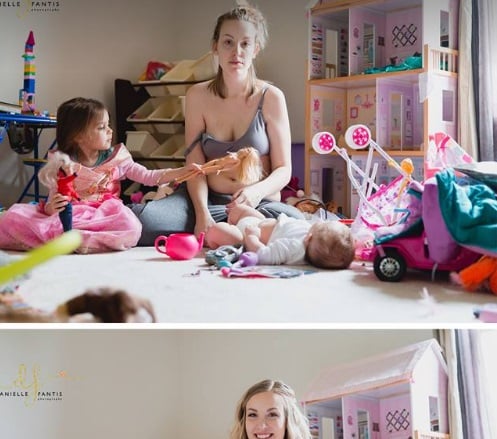~
In our social media-soaked world, images of what motherhood really looks and feels like are rare.
So often we see the posts of friends, acquaintances, and celebrities that show only the highlight reel of their lives—the ecstatic vacation shots or family photos with squeaky clean, smiling faces.
We don’t usually see images of other families’ mealtimes where the kids are crying, or how nights can feel like an endless desert of desperation if you have a child who doesn’t sleep well.
Kathy DiVincenzo, a mother, childbirth educator, and doula, captured the stunning highs and lows of motherhood in a post that’s been shared nearly 70,000 times.
“May has been declared Postpartum Depression Awareness Month and as someone with diagnosed postpartum depression, anxiety, and OCD I feel like it’s time to show you what that can really look like, not just the side of me that’s ‘Facebook worthy,'” DiVincenzo wrote on Facebook.
Her post features two photos of DiVincenzo and her children that are strikingly different from each other, despite having been shot in the same location. One shows a smiling, polished DiVincenzo in a tidy playroom. In the other photo, she looks tired and unhappy, wearing a nursing bra with one strap down, and toys strewn across the room. The photos were both taken by Danielle Fantis, a friend of DiVincenzo’s, who also suffered from postpartum depression.
“The truth is, both of these pictures represent my life depending on the day. I would only ever comfortably share one of these realities though and that’s the problem. The only thing more exhausting than having these conditions is pretending daily that I don’t,” she writes.
As a mom who had postpartum depression, and continues to deal with anxiety and sometimes depression, these photos resonate deeply. They broadcast the disparity between what many of us internalize as how motherhood should be, and the reality of mothering with mental illness. The images make clear how high the highs can be, and how shattering the lows are.
With as many as one in five mothers struggling from a perinatal mood disorder, it’s not surprising that DiVincenzo’s post garnered over 12,000 comments, almost entirely from other moms sharing a slice of their story or simply a heart as an acknowledgement that they too have dealt with postpartum depression.
“We need to stop assuming that the postpartum period is always euphoric,” she writes. “We need to start asking new parents how they’re doing in a deeper way than the normal, ‘So how are you doing?’ that triggers the knee jerk, ‘Everything’s great!’ response. We need to learn the signs, symptoms, risk factors, and support plans for postpartum conditions.”
Postpartum depression, for me, was a disease of isolation. While I was fortunate to have access to support, at the time, I shared what I was actually going through with very few people. I felt shame that I wasn’t having an idyllic experience of new motherhood. That I wondered if becoming a parent was a huge mistake. That I fantasized about being hospitalized so I could have a break, so I could sleep.
DiVincenzo’s photos and posts are a powerful visual representation of the fact that postpartum depression—or for that matter, any mental illness—often go unnoticed. We can hide it beneath a smile, a polished photograph. By sharing her vulnerable image and words, she gives permission to other women to share their story or shed some shame.
“In case no one has told you, you’re doing an amazing job,” writes DiVincenzo. “You are loved and you are worthy. You’re not alone.”
~
Author: Lynn Shattuck
Image: Courtesy of Kathy DiVincenzo/Facebook
Editor: Nicole Cameron









Read 2 comments and reply